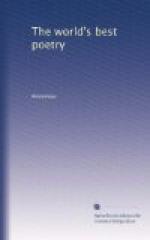Now born again, from depths where thou
wert hurled,
A radiant eagle dost thou
rise;
Winging thy flight again to rule the world,
Thine image reascends the
skies.
No longer now the robber of a crown,—
The insolent usurper,—he,
With cushions of a throne, unpitying,
down
Who pressed the throat of
Liberty,—
Old slave of the Alliance, sad and lone,
Who died upon a sombre rock,
And France’s image until death dragged
on
For chain, beneath the stranger’s
stroke,—
NAPOLEON stands, unsullied by a stain:
Thanks to the flatterer’s
tuneful race
The lying poets who ring praises vain,
Has Caesar ’mong the
gods found place!
His image to the city-walls gives light;
His name has made the city’s
hum,—
Still sounded ceaselessly, as through
the fight
It echoed farther than the
drum.
From the high suburbs, where the people
crowd,
Doth Paris, an old pilgrim
now,
Each day descend to greet the pillar proud,
And humble there his monarch
brow;—
The arms encumbered with a mortal wreath,
With flowers for that bronze’s
pall,
(No mothers look on, as they pass beneath,—
It grew beneath their tears
so tall!)—
In working-vest, in drunkenness of soul,
Unto the fife’s and
trumpet’s tone,
Doth joyous Paris dance the Carmagnole
Around the great Napoleon.
Thus, Gentle Monarchs, pass unnoted on!
Mild Pastors of Mankind, away!
Sages, depart, as common brows have gone,
Devoid of the immortal ray!
For vainly you make light the people’s
chain;
And vainly, like a calm flock,
come
On your own footsteps, without sweat or
pain,
The people,—treading
towards their tomb.
Soon as your star doth to its setting
glide,
And its last lustre shall
be given
By your quenched name,—upon
the popular tide
Scarce a faint furrow shall
be riven.
Pass, pass ye on! For you no statue
high!
Your names shall vanish from
the horde:
Their memory is for those who lead to
die
Beneath the cannon and the
sword;
Their love, for him who on the humid field
By thousands lays to rot their
bones;
For him, who bids them pyramids to build,—
And bear upon their backs
the stones!
From the French of AUGUSTE BARBIER.
* * * * *
ON THE WARRES IN IRELAND.
FROM “EPIGRAMS,” BOOK IV. EPIGRAM 6.
I praised the speech, but cannot now abide
it,
That warre is sweet to those that have
not try’d it;
For I have proved it now and plainly see’t,
It is so sweet, it maketh all things sweet.
At home Canaric wines and Greek grow lothsome;
Here milk is nectar, water tasteth toothsome.
There without baked, rost, boyl’d,




